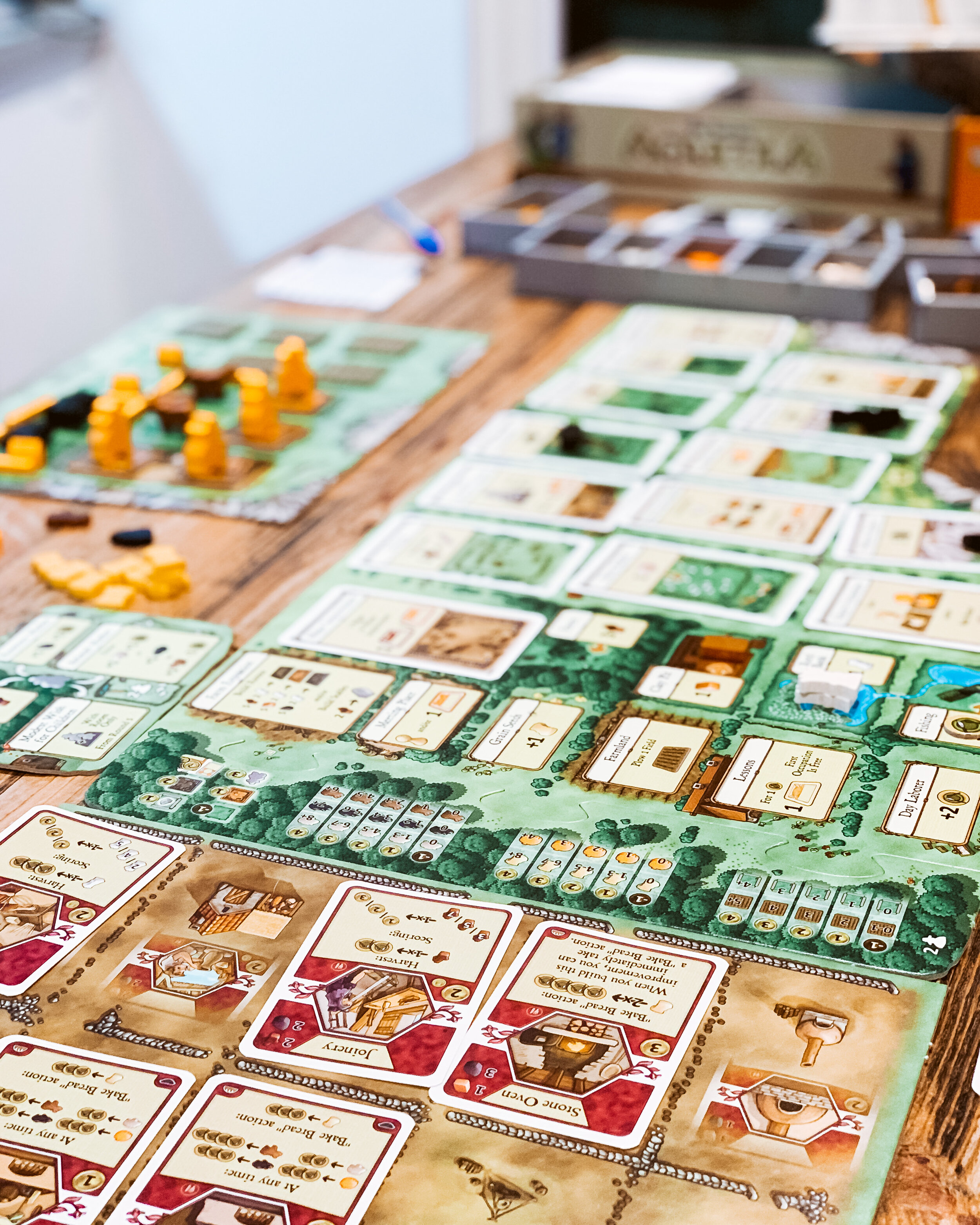Seven Mindful Reasons to Play a Board Game
It’s a typical Tuesday night. Kevin made tacos for dinner, and I’m cleaning up the kitchen. We watched a TV show over our meal (hey, no one’s perfect), but that’s turned off now, in favor of some streaming music. There’s a board game laid out on the table, and maybe a glass of wine waiting for me and a beer ready for him.
Actually, minus the tacos, with or without the drinks, and no matter who cooked/cleaned, that’s a pretty typical night for us. We play a lot of board games.
A lot of board games. My minimalist purging tendencies are strictly prohibited from having their way with the game shelf, but you know what? I’m okay with it, because board games happen to be a fantastic slow living tool.
I did a quick poll on my Instagram Stories last week to see what most people thought of when I mentioned “board games,” and the vast majority came up with Monopoly or Scrabble. While I’m sure many fun family hours have been spent playing those games (okay, maybe not Monopoly), they aren’t really the kinds of games I’m talking about.
Over the past 10-15 years, board gaming in the US has shifted from a focus on simple family and party games to a much more diverse landscape of games meant to be enjoyed by small groups of adults. You’ll sometimes hear them called “Eurogames” or “German-style board games” because the first ones to become popular were English translations of German originals. These games are less luck- or knowledge-dependent than traditional American games, and more focused on strategy. Instead of being abstract like chess or Go though, they usually boast beautiful artwork and interesting themes—from building a cathedral, to colonizing Mars, to controlling a pandemic.
Here’s why I think you should give them a try:
Playing a board game forces you to set aside the phone. I mean, you could conceivably check Facebook between turns, but it would compromise your enjoyment of the game, your fellow players would all be annoyed with you, and your lack of attention would probably make you lose. I love what the Internet and mobile technology has given us, but it just feels good to step away every now and then.
Games focus the monkey mind. Board games come in a lot of flavors, from light and casual to in-depth and complicated, but the best ones are adept at putting players into a flow state. The feeling after a good game can be very much like opening your eyes after a meditation session.
Playing a strategic game can provide a “route in” for introverts. Perhaps this is more pertinent in non-pandemic times, but those times will come again, and as an introvert, there’s very little I dislike more than social gatherings with people I don’t know very well. Boisterous party games can feel a bit daunting too, but learning a new board game and getting to know people within the structure of play feels less overwhelming. There are a lot of cooperative, strategic games out there that make it even easier.
Board games provide “quality time” with family. This one’s especially pertinent to pandemic times. Recently, when I suggested an al fresco family dinner on the roof, my teenage son asked, “What are we even going to talk about? How we’ve all been in the same house together not going anywhere for three months?” Playing games together provides a shared experience that holds up with or without other conversation.
Unlike puzzles, games get put away between sessions. For those of us living with curious pets or limited amounts of space, it’s nice not to have something taking up table space for extended periods of time.
They’re cost-effective. At first glance, Eurogames can look quite expensive, with many falling in the $40-$80 range. We devised the “movie index” to put the cost in perspective. At $10/ticket, a two-hour movie costs around $5 per person-hour of entertainment. Depending on how many people are playing, it only takes two or three play-throughs of an hourlong $50 game to make it a lot cheaper than going to the theatre, and, believe it or not, most games before more fun rather than less as you play through them multiple times. Learning new strategies, becoming familiar with the rules, and beginning to anticipate upcoming events can all increase your enjoyment of a game on subsequent plays.
They’re fun. It may take some experimenting to find the right type of game for you and those you spend time with, but I have no doubt at all that, with a little help, you can find one that you’ll be eager to play again and again.
If I’ve convinced you to give board gaming a try, there are number of places you can go to get started.
Your friendly local game store should have knowledgable staff who can help. In normal times, many of them even host game days, or let you borrow copies for test runs in the store.
BoardGameGeek.com is a huge game-review site and community. It can be a bit overwhelming at, but it’s a treasure trove of information, with a lively and useful user forum. I find their “weight” rating especially useful. Users can rate games on a scale of 1-5 for difficulty/complexity. If you’re just starting out and not up for a big learning curve, aim for games below a 2.5.
And finally, I regularly feature games we’re playing on my Instagram Stories, and you can always message me on social media to ask for more info or recommendations!



